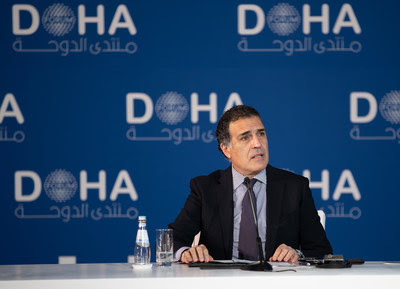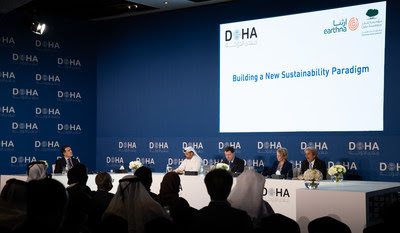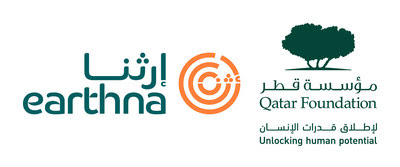تنصب جهود المركز على تحقيق التكامل بين بحوث وسياسات الاستدامة في مجالات المناخات القاحلة والمدن والمجتمعات المستدامة
الدوحة، قطر, 26 مارس 2022 /PRNewswire/ — أعلنت مؤسسة قطر للتربية والعلوم وتنمية المجتمع خلال القمة الدبلوماسية السنوية لمنتدى الدوحة، عن تأسيس مركز “إرثنا – مركزٌ لمستقبل مستدام” تحت مظلتها، وهو مركز غير ربحيّ متخصص في وضع السياسات وإسداء المشورة.

سيواصل مركز “إرثنا” الجهود التي ما فتئت تبذلها مؤسسة قطر في مجال الاستدامة على مر سنوات عديدة، وسيعمل على توجيه منظومة التعليم والبحوث والابتكار في مؤسسة قطر نحو إيجاد حلول تُعزز دور دولة قطر العالمي في وضع سياسات الاستدامة وتكريس الرؤى والإمكانات الفريدة من نوعها التي تتمتع بها البلاد في هذا الصدد.
ستنصب مساعي مركز “إرثنا” على تكريس القيادة الفكرية في صُنع السياسات، وتحديد أولويات هذه السياسات وتعزيزها، وترسيخ الروابط بين مجالات التعليم والبحوث والصناعة، وتوسيع شبكات التعاون لمؤسسة قطر محليًا ودوليًا، وذلك بالتركيز على مجالات الاستدامة في المدن الحارة والقاحلة، والطاقة المستدامة، والاستفادة مما تتمتع به المدينة التعليمية من إمكانات لاختبار أحدث التقنيات وتطبيقاتها المستدامة.
وقد تطرّق الإعلان عن تأسيس مركز “إرثنا” خلال جلسة نقاشية رفيعة المستوى في حفل افتتاح القمة الدبلوماسية السنوية لمنتدى الدوحة، إلى مناقشة السبل الكفيلة بجعل المدن محور الحلول العالمية لاستدامة الطبيعية والمناخ.

وتضمنت الجلسة مشاركة نخبة من الخبراء أثروا المناقشة بتصوراتهم، ومن ضمنهم سعادة الشيخ الدكتور فالح بن ناصر بن أحمد بن علي آل ثاني، وزير البيئة والتغير المناخي؛ وسعادة اللورد فنسنت توماس كيفيني، عمدة لندن؛ ؛ وجين مادجويك، الرئيسة التنفيذية لشركة ويتلاندز الدولية؛ ومانويل بولجار فيدال، مدير الممارسات العالمية للمناخ والطاقة بالصندوق العالمي للطبيعة؛ والسيد غونزالو كاسترو دي لا ماتا، المدير التنفيذي لمركز “إرثنا”.
وبهذه المناسبة، صرحت سعادة الشيخة هند بنت حمد آل ثاني، نائب رئيس مجلس إدارة مؤسسة قطر والرئيس التنفيذي للمؤسسة قائلةً: “إنّ ارتباطنا بالطبيعة يظل العنصر الأساسي في بناء مستقبلنا. وانطلاقًا من إسهاماتها الرائدة في مجال الاستدامة، كان لمؤسسة قطر دور هام في دعم الأولويات الوطنية، بدءاً من إسهامها في تعزيز الوعي والثقافة المجتمعية بالاستدامة، ووصولاً إلى إيجاد حلول للتحديات البيئية الملّحة في قطر. وبتأسيس مركز “إرثنا”، فإننا نعمل على بناء الجسور بين الأبحاث ومواطن القوّة في مجتمعنا سعيًا إلى التوّصل إلى الحلول الجديدة للسياسات”.
سيُسهم مركز “إرثنا” في تمكين الخبراء، والجهات الحكومية، والمعنيين برسم السياسات واتخاذ القرارات، والشركات، والمؤسسات متعددة الأطراف، والمجتمع المدني لتشييد مستقبل أكثر استدامة، كما سيعمل على مواصلة البناء على ما حققه مؤسسة قطر والكيانات التابعة لها وجهودها الرامية إلى الحثّ على تبني السلوكيات والممارسات المستدامة.

من جهته، علّق السيد دي لا ماتا، قائلاً: “تتمحور جهود مركز “إرثنا” على تطوير الأدوات والحلول والسياسات التي من شأنها تحسين حياة الأفراد في بيئة طبيعية ومزدهرة”.
وأضاف قائلاً: ” تقع دولة قطر في صميم التحديات العالمية في مجال مخاطر تغيّر المناخ وتحوّلات الطاقة، مما يمنحنا فرصة مناسبة ليكون لنا دور رائد في الحوار العالمي حول تعزيز السياسات المستدامة. سيجمع مركز “إرثنا” الخبراء المحليين والدوليين داخل قطر ليُسهموا معًا في تصميم وتنفيذ الحلول التي يمكن تطبيقها في المجتمعات عبر العالم بأسره”.
سينظم مركز “إرثنا” برامج مجتمعية في مجالات الطاقة المستدامة، وأمن الموارد وإدارتها، والحماية والاستعادة البيئية، والاقتصاد الدائري، والرفاه الاجتماعي.
لمعرفة المزيد عن “إرثنا – مركز لمستقبل مستدام”، يرجى زيارة الموقع الإلكتروني www.earthna.qa
مؤسسة قطر – إطلاق قدرات الإنسان
مؤسسة قطر للتربية والعلوم وتنمية المجتمع هي منظمة غير ربحية تدعم دولة قطر في مسيرتها نحو بناء اقتصاد متنوع ومستدام. وتسعى المؤسسة لتلبية احتياجات الشعب القطري والعالم، من خلال توفير برامج متخصصة، ترتكز على بيئة ابتكارية تجمع ما بين التعليم، والبحوث والعلوم، والتنمية المجتمعية.
تأسست مؤسسة قطر في عام 1995 بناء على رؤية حكيمة تشاركها صاحب السمو الأمير الوالد الشيخ حمد بن خليفة آل ثاني وصاحبة السمو الشيخة موزا بنت ناصر تقوم على توفير تعليم نوعي لأبناء قطر. واليوم، يوفر نظام مؤسسة قطر التعليمي الراقي فرص التعلّم مدى الحياة لأفراد المجتمع، بدءاً من سن الستة أشهر وحتى الدكتوراه، لتمكينهم من المنافسة في بيئة عالمية، والمساهمة في تنمية وطنهم.
كما أنشأت مؤسسة قطر صرحًا متعدد التخصصات للابتكار في قطر، يعمل فيه الباحثون المحليون على مجابهة التحديات الوطنية والعالمية الملحة. وعبر نشر ثقافة التعلّم مدى الحياة، وتحفيز المشاركة المجتمعية في برامج تدعم الثقافة القطرية، تُمكّن مؤسسة قطر المجتمع المحلي، وتساهم في بناء عالم أفضل.
للاطلاع على مبادرات مؤسسة قطر ومشاريعها، يُرجى زيارة الموقع الإلكتروني http://www.qf.org.qa
للاطلاع على أبرز مستجداتنا، يمكنكم زيارة صفحاتنا على مواقع التواصل الاجتماعي: Instagram, Facebook, Twitter and LinkedIn.
“ إرثنا – مركز لمستقبل مستدام “
“ إرثنا – مركز لمستقبل مستدام“ هو مركز غير ربحيّ، أسسته مؤسسة قطر للتربية والعلوم وتنمية المجتمع، تتمحور مهامه حول وضع السياسات وإسداء المشورة وتحقيق التأثير المنشود في مجال الاستدامة على المستويين المحلي والدولي.
من خلال العمل على تحقيق التكامل بين الخبرات التقنية والبحثية وإسداء المشورة ودعم قضايا الاستدامة، سيُمكّن “إرثنا – مركز لمستقبل مستدام“ الخبراء والباحثين والأكاديميين، والجهات الحكومية، والمعنيين بصياغة السياسات واتخاذ القرارات، والشركات، والمؤسسات متعددة الأطراف، والمجتمع المدني من تشييد مستقبل متجدد وأكثر استدامة.
يُدير “إرثنا – مركز لمستقبل مستدام“ برامج سنوية متعددة في مجال الاستدامة، تركز على المناخات القاحلة والجافة والمُدن المتجددة والمُستدامة والطاقة المُستدامة في ظلّ الإمكانات النموذجية التي تتمتع بها المدينة التعليمية لاختبار أحدث التقنيات والممارسات في مجال الاستدامة.
تتركز مساعي “إرثنا – مركز لمستقبل مستدام” على تطوير الأدوات والحلول والسياسات لتوفير بيئة طبيعية مزدهرة تهدف إلى تحسين نمط حياة أفراد المجتمع وذلك من خلال العمل جنبًا إلى جنب مع المجتمع لإعادة ابتكار وتصميم الحلول من خلال استخدام مواردنا بما يُلبي احتياجاتنا المحلية وثقافتنا المجتمعية، ويُمكّننا من إيصال رسالتنا المفعمة بالأمل إلى العالم، والعمل بشكل مؤثر على تعزيز إرثنا.